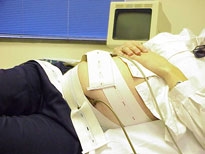Schedule a Consultation
216-480-4620Schedule a Consultation
216-480-4620
The non-stress test (also called a fetal non-stress test or a non-stress test, and commonly abbreviated NST) is typically performed at or after 28 weeks, and is used to determine the condition of the growing baby. It is non-invasive to the baby and mother, hence “non-stress.” It can often be performed in the doctor’s office, though hospitals can perform them, as well.
Non-stress tests are often required when:
The information obtained during a non-stress test may help the doctor to determine if the baby is getting the appropriate amount of blood or oxygen to the brain. Doctors and nurses should be on the lookout for signs of fetal distress. Depending on the circumstances, these tests may be isolated, or may be required more frequently (sometimes many times per week).
During a non-stress test, doctors or obstetrical nurses will position a special belt over the mother’s belly to measure contractions, and another to measure the baby’s heart rate. These belts have wires that connect to a computer which will display the two measurements side-by-side. The mother may be asked to push a button when she feels the baby move.
The test often lasts about 20 to 30 minutes, and the health care providers will watch to see how the baby’s heart rate reacts to its own movement. When the baby moves, its heart rate should increase. If the baby is asleep, nurses may use a buzzer to wake the baby up, or may give the mother juice.
The test is called “reactive” when the responses indicate that the baby is receiving the proper amount of blood flow and oxygenation. If the test is “non-reactive,” however, more tests may be required to determine if there are any problems. Those tests might include a biophysical profile (non-stress tests performed jointly with ultrasound tests) or contraction stress tests (examination of how the baby’s heart rate reacts to contractions).
If you were high risk or had problems during pregnancy, non-stress testing may have been required by the standard of care, and if properly performed may have helped to prevent injury to your baby. To answer your questions about whether your doctors and nurses did everything they could during your pregnancy, contact our medical malpractice attorneys at (440) 252-4399 or online for a free consultation.

